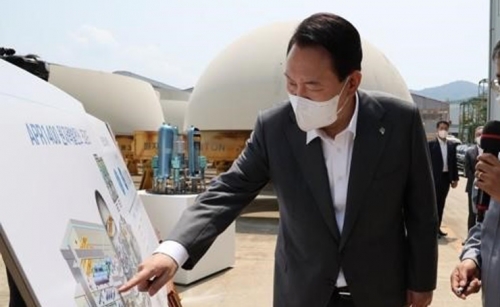South Korea to expand nuclear power generation to over 30% of total by 2030
Agencies | Sejong
The Daily Tribune – www.newsofbahrain.com
South Korea will expand its generation of nuclear power to more than 30 percent of its total energy creation by 2030 as part of efforts to boost energy security and better meet carbon neutrality goals, the industry ministry said Tuesday.
The Yoon Suk-yeol government has pledged to reverse the nuclear phase-out policy of the previous administration, rebuild the industry and support its expansion overseas, South Korean News Agency (Yonhap) reported.
The comparable figure came to 27.4 percent as of 2021.
According to the comprehensive energy plan announced Tuesday, the government will resume the construction of the Shin-Hanul No. 3 and No. 4 nuclear reactors, and continue operations of existing reactors, which is expected to increase the country's nuclear energy ratio to over 30 percent by 2030.
The number of nuclear reactors in South Korea will grow to 28 by 2030 from the current 24. The previous government had sought to cut the nuclear energy ratio to 23.9 percent and decrease the number of reactors in operation to 18 by the time.
The Yoon government also seeks to export 10 nuclear reactors by 2030 and to earmark 400 billion won (US$308 million) for the development of small modular reactors (SMR), according to the Ministry of Trade, Industry and Energy.
The plan also called for nurturing the hydrogen industry by securing homegrown key technologies for advanced materials and parts.
The blueprint was endorsed during the Cabinet meeting presided over by President Yoon earlier in the day.
The ministry said the government will announce a detailed plan on the right mix of renewable energy resources by the end of this year in an effort to achieve carbon neutrality.
South Korea has pledged to reduce its greenhouse gas emissions by 40 percent from the 2018 levels by 2030 and reach carbon neutrality by 2050.
"If the plans are implemented without a hitch, our dependence on imported fossil fuels is expected to be reduced to around 60 percent in 2030 from last year's 81.8 percent," the ministry said.
"Some 100,000 new jobs likely will be created in the energy sector by 2030, as the number of innovative venture firms will double to 5,000 by that time," it added.
In an effort to strengthen energy security, the government vowed to increase the country's strategic reserves for major energy resources and to deepen international cooperation in a move to diversify its import channels of key industry items.
It will boost public firms' role in securing overseas resources while actively backing the private sector for their overseas resources development.
The government will push to set up a special law on the establishment of a "control tower" and an early warning system on the national energy security, according to the ministry.
Related Posts

